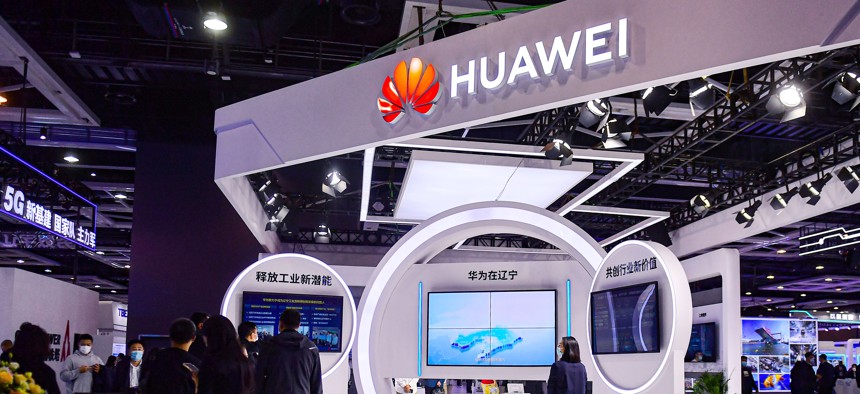FCC Bans Sale of New Devices From Chinese Companies Huawei, ZTE and Others

SHENYANG, CHINA - NOVEMBER 07: People visit Huawei booth during an exhibition of the 2022 Global Industrial Internet Conference on November 7, 2022 in Shenyang, Liaoning Province of China. (Photo by VCG/VCG via Getty Images) Visual China Group
Friday’s order to ban new sales and imports from five Chinese companies is the first time in its history that the agency has blocked the sale of telecommunications equipment on national security grounds.
The Federal Communications Commission voted unanimously on Friday to ban U.S. sales of new Chinese telecommunications equipment and devices produced by Huawei and ZTE—as well as to restrict the use of other Chinese-made video surveillance equipment—over national security concerns.
The FCC’s report and order outlining the new rules said that the agency took the step “to further secure our communications networks and supply chains from equipment that poses an unacceptable risk to national security of the United States or the security and safety of United States persons.”
Congress and the federal government have moved in recent years to limit the sale and import of equipment and devices produced by Chinese firms, citing concerns about the companies’ close ties to Beijing and the potential for bad actors to exploit vulnerabilities in the technologies to conduct cyberespionage operations or cyberattacks on U.S. critical infrastructure.
“The FCC is committed to protecting our national security by ensuring that untrustworthy communications equipment is not authorized for use within our borders, and we are continuing that work here,” FCC Chairwoman Jessica Rosenworcel said in a news release. “These new rules are an important part of our ongoing actions to protect the American people from national security threats involving telecommunications.”
While the FCC has taken steps in the past to crack down on the use of telecommunications equipment from Chinese firms—including designating Huawei and ZTE as national security threats in June 2020—Friday’s announcement is the first time the agency has directly moved to limit public access to new devices over security risks.
“Our unanimous decision represents the first time in FCC history that we have voted to prohibit the authorization of new equipment based on national security concerns,” FCC Commissioner Brendan Carr said in a tweet on Friday.
Huawei and ZTE did not respond to requests for comment.
The FCC’s new rules implement the directive of the Secure Equipment Act, which President Joe Biden signed into law on Nov. 11, 2021. The law prohibits the FCC from reviewing or issuing new equipment licenses to firms if they are on its “Covered Equipment or Services List.” All five Chinese companies targeted by the FCC—Huawei and ZTE, as well as Hikvision, Dahua and Hytera—were added to the covered list on March 12, 2021.
Although federal agencies were previously barred in the fiscal year 2019 National Defense Authorization Act from using equipment or services provided by the five firms, a report released by Georgetown University’s Center for Security and Emerging Technology in October found that at least 1,681 state and local governments across 49 states purchased technologies from the banned companies between 2015 and 2021.
The rules, which cover the sale and import of new equipment and devices from the companies, will apply to “future authorizations of equipment identified on the covered list,” according to the FCC. The ban does not apply to previously authorized equipment from the five firms, although the FCC’s report and order said the agency also adopted a notice of proposed rulemaking to, in part, “seek further comment on potential additional revisions to the rules and procedures associated with prohibiting the authorization of ‘covered’ equipment in our equipment authorization program.”
In addition to banning new Huawei and ZTE equipment, the order also restricts the sales and import of new “video surveillance and telecommunications equipment” made by Hikvision, Dahua and Hytera.
“For these three companies, we will require them to document what safeguards they will put in place on marketing or sale for these purposes, and we are putting in place a freeze on all of their telecommunications and video surveillance equipment authorization applications until that work is done,” Rosenworcel said.
In a statement to Nextgov, a Hikvision spokesperson said the company’s video products “present no security threat to the United States and there is no technical or legal justification for the Federal Communications Commission’s decision to remove Hikvision’s future products from the equipment authorization process.”
“This decision by the FCC will do nothing to protect U.S. national security, but will do a great deal to make it more harmful and more expensive for U.S. small businesses, local authorities, school districts and individual consumers to protect themselves, their homes, businesses and property,” the spokesperson added. “Hikvision USA will continue to serve its distributor partners and customers in full compliance with all applicable laws and regulations.”






